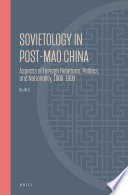

Most ebook files are in PDF format, so you can easily read them using various software such as Foxit Reader or directly on the Google Chrome browser.
Some ebook files are released by publishers in other formats such as .awz, .mobi, .epub, .fb2, etc. You may need to install specific software to read these formats on mobile/PC, such as Calibre.
Please read the tutorial at this link: https://ebookbell.com/faq
We offer FREE conversion to the popular formats you request; however, this may take some time. Therefore, right after payment, please email us, and we will try to provide the service as quickly as possible.
For some exceptional file formats or broken links (if any), please refrain from opening any disputes. Instead, email us first, and we will try to assist within a maximum of 6 hours.
EbookBell Team

4.4
92 reviewsRelying on a larger body of updated Chinese sources, Li re-evaluates many key issues in post-Mao Chinese Sovietology, arguing that the Chinese views on the Soviet Union had been influenced and shaped by the ups-and-downs of Sino-Soviet (and later Sino-Russian) relations, China’s domestic political climate, and the political developments in Moscow. By researching the country of the Soviet Union, Chinese Soviet-watchers did not focus on the USSR alone, but mostly attempted to confirm and legitimize the Chinese state policies of reform and open door in both decades. By examining the Soviet past, Chinese scholars not only demonstrated concern for the survival of the CCP regime, but also attempted to envision the future direction and position of China in the post-communist world.